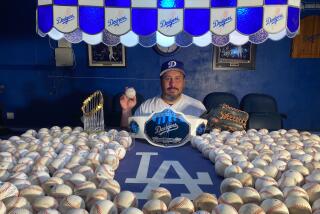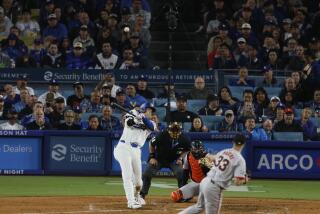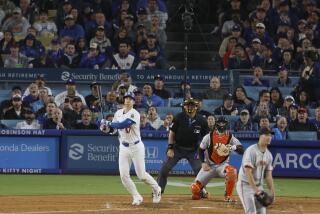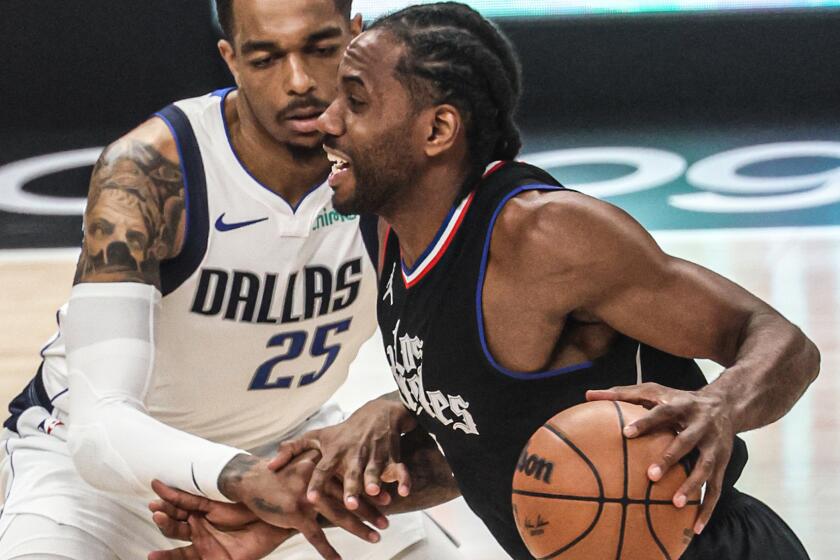Paul DePodesta is captured to a T in film ‘Moneyball’
He first appears in the movie as he first appeared with the Dodgers, a wallflower pulled reluctantly into the spotlight, a nerd suddenly tapped on the shoulder by the cool kids.
The character that is supposed to be Paul DePodesta is a rumpled and bespectacled figure leaning against a wall whispering trade vetoes to a Cleveland Indians colleague.
The character that is supposed to be Billy Beane openly wonders who he is, and why everyone thinks he’s so smart, and so begins a journey that Dodgers fans will instantly and painfully recognize.
The movie, starring Brad Pitt and opening Friday, is called “Moneyball.” But if you ask me, it could have been called “DePo Man.”
While the flick is based on the book that chronicled Beane’s use of new statistics to challenge the traditional baseball world in rebuilding the Oakland Athletics, the real hero is the reticent, reluctant guru of these numbers, a Harvard-educated geek who would later spend two years as a failed general manager of the Dodgers.
How reticent is DePodesta? He is the only main character who did not allow his name to be used in the movie, with actor Jonah Hill instead portraying someone named Peter Brand.
“I remember thinking how unforgiving it might be to have someone else portray you to the rest of the world,” said DePodesta in a phone interview Tuesday from New York, where he is the vice president of player development and scouting for the New York Mets. “It could be great, but it also could be very unnerving, and once I read the script and realized it was a piece of fiction, then I saw no reason for my name to be attached to it.”
How reluctant is DePodesta? I saw the movie before he did. In fact, on Tuesday he still had not seen it, but a screening is being arranged so he doesn’t have to sneak in the back of a theater and watch it with everyone else.
“I really do want to see before it opens,” he said, laughing. “And who knows, maybe fiction will be better for me than reality.”
Parts of the movie indeed seem fictional, with the scouts being painted as evil caricatures while Beane, as played by Pitt, comes across as this overblown swashbuckling hero despite the fact that “Moneyball” never really worked, his teams having yet to even reach the World Series.
But Hill nails DePodesta. Hill nails his shy mannerisms, his uncomfortable silences, his awkwardness in sharing his newfangled theories with old men spitting tobacco into cups, his fear in dealing with players.
At the time of the filming Hill was a little stouter than the rail-thin DePodesta, but everything else fits, everything else I remember exactly, from the odd dress to the innovative mind to the unwavering determination in beliefs that could only be shared in darkened film rooms or back hallways.
“I saw a lot of myself in Paul in a completely different way,” said Hill in a phone interview. “I see a quiet rebelliousness in Paul, and I see him finding great difficulty in being defined by strangers.”
Contrary to the gossip, DePodesta confirmed he had decided to remove his name from the film long before Hill became attached. DePodesta actually hung out in a group of people, including Hill, for a day before the filming, which was apparently enough for the kid to catch his vibe.
“I talked with [director] Bennett [Miller] about portraying a guy who blends into the wall until suddenly a light shines upon him,” Hill said.
That was DePodesta when he took over the Dodgers in February 2004, a 31-year-old prodigy occupying a seat once held by Branch Rickey and Al Campanis. That light made him blink, and he wasn’t the only one.
He clearly wasn’t ready for the job, which lasted only two years before he was fired for essentially tearing the place apart. But I clearly wasn’t ready for him, and never really gave him time to implement the baseball sabermetrics that I have since come to accept and understand.
“The Dodgers have a new face, and it is dabbed in Clearasil,” I wrote when he was hired. “The Dodgers have a new voice, and it speaks in megabytes.”
Yeah, I never really gave him much of a chance, I saw him as some robot enemy brought here to destroy our blue heaven. Watching him in the movie reminded me that he was, instead, nothing more sinister than a numbers cruncher who just couldn’t equate with people.
DePodesta was brilliant, but never condescending or patronizing or even impolite. He always did every interview, returned every phone call, faced every shot from every angle.
He was a stand-up guy. But he brought in a bunch of are-you-sitting-down ideas that didn’t work for a team with a big payroll and immediate expectations. Maybe in Oakland he could have survived gutting the roster of a clubhouse leader and bullpen stalwart during a championship race, but it didn’t work here, not when he traded Paul LoDuca and Guillermo Mota in the summer of 2004 from a team that was 60-42.
During the rest of DePodesta’s tenure here, the Dodgers were swept in a playoff series and were 104-118, and his legacy can best be remembered in a three-word chant.
“Hee-Seop Choi … Hee-Seop Choi.”
When he was fired in October 2005, I wrote, “Some will say DePodesta was never given a fair chance. I say he never should have been hired in the first place.”
Turns out, both statements were probably true.
DePodesta has learned enough since then that when I asked him whether he wanted to be a general manager again, there was no awkward silence.
“No, not particularly,” he said quickly, strongly. “From my perspective, it’s not necessarily a great job.”
To completely understand that sentiment, we’ll just have to wait for the movie about Ned Colletti.
twitter.com/billplaschke
More to Read
Get our high school sports newsletter
Prep Rally is devoted to the SoCal high school sports experience, bringing you scores, stories and a behind-the-scenes look at what makes prep sports so popular.
You may occasionally receive promotional content from the Los Angeles Times.







